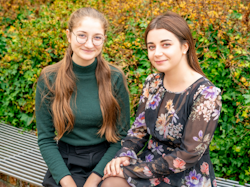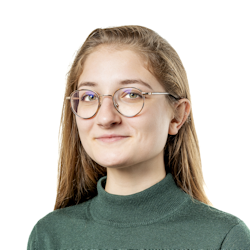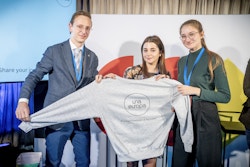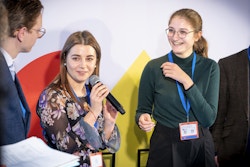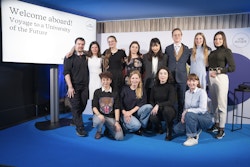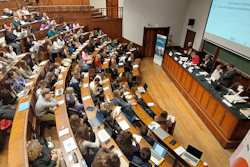What motivated you to take on this leadership role in Una Europa’s Student Board?
Elvire: Even though we are Co-chairs, we're all at the same level on the Student Board. Being Co-chairs is a way for us to bring the ideas and vision students have to the Board of Directors and the Project Steering Committee. This position allows us to speak directly to the stakeholders who have real impact on the future of Una Europa and the courses and programmes that may be created.
Febe: When I was younger, I worked closely with the Italian education ministry as president of my region’s student council and gained experience in student representation and facilitation. In the role of Co-chairs, as Elvire was saying, we have the skills to articulate the vision that we, together as a board, develop. So, what motivated me at first was the opportunity to make the skills I’ve developed available to the Board and the half a million students we have in our community, and to make sure we can represent them in the best way possible.
How do you see the Student Board's role evolving over the year ahead?
Elvire: I think Febe and I will agree on this: we want to work on student representation – to be part of each Work Package and Cluster so that the student voice can really be heard. We want to participate in the process of developing Una Europa’s degrees, in shaping a University of the Future.
Febe: We also need synergy between our Student Board and our Local Taskforces. We want our Local Taskforces to take on a more project-implementation role so that they can be our right hand. At the same time, we also want to make sure we’re getting feedback from our universities’ Student Councils, and that we’re in contact with the students at the base – that they feel represented and that the Board is not just some kind of elite institution that just two of us at each university can access. We want to make sure that the people who sit on the Board represent the voices of everyone, even the students who don’t know what Una Europa is yet.
" We want to work on student representation – to be part of each Work Package and Cluster so that the student voice can really be heard. We want to participate in the process of developing Una Europa’s degrees, in shaping a University of the Future. "
Elvire Da Cruz, Co-chair, Una Europa Student Board
What are the biggest concerns you're hearing from the Una Europa Student Board right now?
Elvire: The biggest challenge right now is communication. To be heard and to be known by every student across the Una Europa community… Eleven universities is a huge alliance. It’s a pity that many of these students do not know that the alliance exists and that they might benefit from it. That’s something we need to work on. Representation, too. Students need to be part of the process of creating new diplomas and curriculums.
Febe: We also think that events such as the Student Congress, which really work to generate more student engagement, are restricted to a really small number of people. We have to give students more opportunities to get involved. It’s impossible, of course, to have all of them moving around Europe, but we can explore other ways. Like virtual mobility, for example.
Is there a role for Una Europa's Student Board in building European cooperation?
Elvire: By participating in the alliance – for example, by being involved in Work Packages – we're not only contributing to developing the diplomas the alliance has to offer but also to growing Una Europa as a European collaboration network. As a Student Board, we bring perspectives that teachers, staff and rectors might not have. It's important that this collaboration is seen not only by 'older people' but also by the people who will be involved in European collaboration in decades to come.
Febe: I think the most relevant part of our work is that we are facilitating inter-generational dialogue and exchange. European society, cooperation, collaboration…it’s going to be ours in a few years. We have to be in constant dialogue with the institutions to learn what is in place now. By learning, we know what not to do again. We know how to improve. It’s the same reason why we study history. Facilitating this kind of dialogue is a very big responsibility, but it’s also a really big opportunity.
